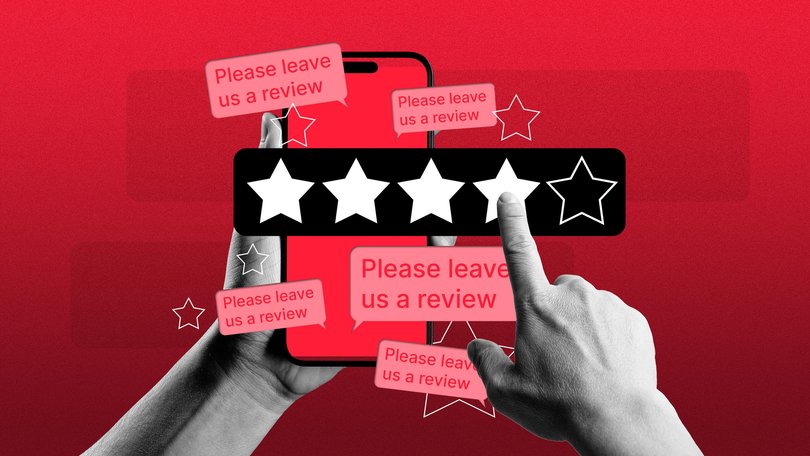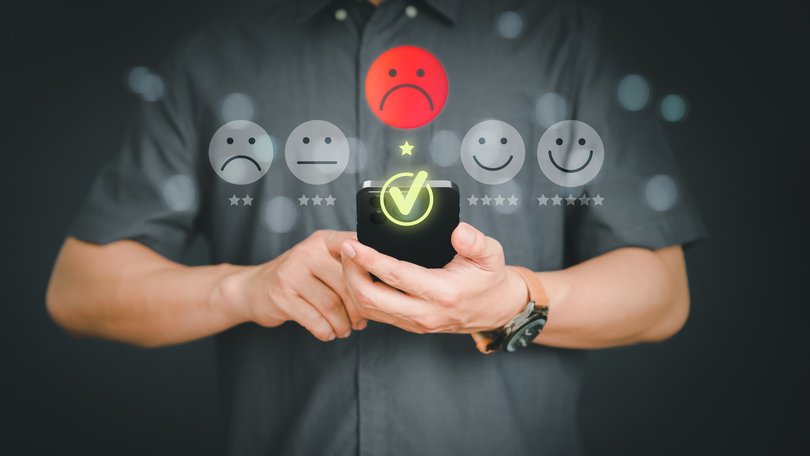WASHINGTON POST: Sick of being asked for feedback, surveys or star ratings? Review Culture is wearing us down
THE WASHINGTON POST: Those coveted five-star ratings may be doing more harm than good.

The stitches in Cory Lonas’s head were fresh. His mind felt loopy coming down from anesthesia; he couldn’t hear. It had only been 24 hours since Lonas underwent cochlear implant surgery when, through bleary eyes, the 39-year-old saw an email come in on his phone.
How would he rate his experience at the hospital? How were his interactions with the doctors, the staff, the food? Would he recommend the hospital to a friend?
“It was, like, a day later. I’m hopped up on painkillers, I’m delirious. And they’re like, ‘Hey, how’d you like your stay?’” the Rockland County, New York-based lighting technician — and longtime resenter of customer-feedback surveys — says over the phone, incredulous.
Sign up to The Nightly's newsletters.
Get the first look at the digital newspaper, curated daily stories and breaking headlines delivered to your inbox.
By continuing you agree to our Terms and Privacy Policy.On the other hand, “They literally did drill a hole in my skull and put an implant in my brain,” he says. He both survived the ordeal and lived to review it, so: “Five stars.”
The surveys, they haunt us. Everywhere we dine, stay, shop and travel, the inevitable “rate your experience” awaits, ready to hound us for our thoughts as soon as the transaction concludes. SurveyPlanet, a customer-feedback platform for organisations, has identified both “pre-survey fatigue” and “post-survey fatigue” as emerging risks for businesses - consumers’ annoyance at being asked to fill out a survey and annoyance at being asked to fill out a survey on the heels of another survey, respectively.
Let me bear witness to the existence of said fatigues, which we might also call quantification sprawl, Letterboxd culture, five-star thirst: In the time since I started reporting this story, I was asked to leave a top rating for the seller of a phone case I bought on Etsy, a guy who sold me a lamp on Facebook Marketplace and a mobile hibachi chef we hired for my friend’s bachelorette party. Additional email and text prompts to review my experiences came from, among others, the scheduling department at my doctor’s office (the scheduling department!) and a business that managed to turn four contracted days of painting my apartment into five weeks.
How did we wind up spending this much of our precious lives sighing at our devices and futzing with cartoon stars?
Reddit posts on the topic attract a chorus of beleaguered consumers ready to empathise: “Sick and tired of being asked for reviews of everything I buy.” “Sellers - stop doing this if you want good feedback.” “I hate review culture.” Others let their resentments out in tweets: “For the love of Pete stop asking me if I enjoyed my experience visiting your online store, going to the doctor or paying my bills!”
For Ross Presser, a DevOps engineer based in south New Jersey, the exasperation spikes whenever he opens the app HelloFresh to make edits to his weekly order. “‘Was your delivery okay? Did you like the meal? Do you have anything to say about the meal, can you post pictures of it on social media?’” Presser, 58, rattles off.
“Late-stage capitalism,” he says with a rueful laugh.
Sometimes what’s irksome is the sheer audacity. One X user described a delivery guy rooting around in her garage then asking for a five-star review; another was put off by a waiter who asked for one despite reeking of cigarette smoke.
Many people have revealed their policies of giving negative reviews when asked specifically for positive ones or using surveys to complain about surveys; some describe feeling harassed or badgered, even bribed or quid pro quo’d into giving their experience the full five stars of approval. I, for one, remember that years ago a Wave Runner tour company in New Jersey withheld souvenir photos — me and each of my bridesmaids breezing past the Statue of Liberty, naturally — until I’d left a five-star review on Google that mentioned the staffer who’d asked for it by name.

(This is, somewhat newly, illegal: As of October 2024, US businesses can offer consumers incentives for reviews, but not for specifically positive reviews, according to section 465.4 of the Federal Trade Commission’s Consumer Reviews and Testimonials Rule.)
Obviously, there are worse fates than being asked, even repeatedly, to recall and rate a business transaction, especially when it can help customer satisfaction. Still, what can be unnerving is the surreal, dystopian feeling that you’re just compacting all your delights and sorrows and random synapse-firings down into one flat digit (or one happy, angry or neutral smiley face).
Anna Fitzpatrick, a 35-year-old writer in Toronto, laughs to herself every time she gets asked to rate purchases from her local cannabis shop: “When I started smoking weed, it was just some guy at a party!” Absurdity became melancholy, though, when Fitzpatrick’s first book came out and she found herself disturbed by the notion that its success could be influenced by something as reductive as Goodreads’s star-rating system.
Being asked to quantify her feelings about every book, every movie, every app, every tourist destination, she says, “does, I think, change how I interact with the world, for the worse.”
Mr Lonas, too, wonders if review sprawl might be taking away opportunities to use human interaction for its noblest purpose: problem-solving. “I think it’s making people interact less with each other about when things are wrong, and especially when things are right,” Mr Lonas says.
“You come to the review page and write ‘One star, my chicken was undercooked,’ but you didn’t say anything to the server?” he adds. “Maybe the restaurant could have done something to resolve this scenario if you had just spoken up.”
Little academic research exists (yet) on survey fatigue. But Katie Mehr, a marketing professor at the University of Alberta who specialises in consumer evaluations, says that “there’s research to suggest that people often want to help small businesses by giving reviews that are quite positive,” especially over faceless corporations that ostensibly need less help and make you feel like you’re reviewing into a void.
You are, of course, almost never actually reviewing into a void. And no one knows it better than the people whose services you’re rating.
Sarah and Chris Jarrach are 33 and 36, respectively, and their household income depends on how customers rate interactions with them. In their hometown of Boulder, Colorado, she owns a liquor store. He’s a service-lane manager for a Mercedes-Benz service centre.
Sarah wants more and higher ratings on her shop’s Google page. “If someone’s Googling, like, ‘liquor store near me,’ those reviews are gonna come up, and you’re not gonna go to the one that has 3.2 stars. You’re gonna go the one that has 4.8 stars,” Sarah says. And with slim margins, every purchase counts.
Chris’s paycheck itself, meanwhile, is affected by the reviews he gets from customers. A few days after a transaction, his clients are invited to fill out a survey about their experience for internal use. On a past pay plan, Chris got $50 for each survey a customer sent back as long as he stayed at or above the company’s national average employee rating, $25 if he fell below it.
“Surveys are people’s personal report cards,” Chris says. “People just need to remember to be kind to the person that helped them.”
Tas Kabir, 43, who rents out the garden apartment of his Washington DC home, saw his Airbnb rating slip from 4.9 to 4.8 after a guest whose comments indicated he was perfectly satisfied with the stay gave him four stars. “Not the end of the world, but, you know,” Mr Kabir says. Even one more four-star review might endanger his Superhost status.
And Mr Arnheim, senior manager of market research for Amtrak, can attest that even an expansive corporation has humans looking over its surveys. In fact, the rail service recently used them to help overhaul its system for alerting passengers of delays. “We’ve increased the amount of information we’re sharing about what’s taking place, when you can expect resolution, when you can expect to arrive,” Mr Arnheim says. “And before, that was only shared via email. Now we’re serving it through the app and through text.”
Some of Amtrak’s long-distance routes serve steak in their dining car; thanks to the open-ended comments sections on their surveys, Amtrak knows it’s a customer favourite and makes sure to keep it well-stocked. The signature Stephen Starr lobster mac and cheese introduced on first-class Acela dining cars a few years ago remains available for the same reason.
“There probably is some fatigue that takes place because there are so many companies asking for feedback,” Mr Arnheim concedes. “But we really do use those responses.”
And on that note, valued customer, one more question for you. How would you rate your experience reading this article? Would you recommend it to a friend?
© 2025 , The Washington Post
